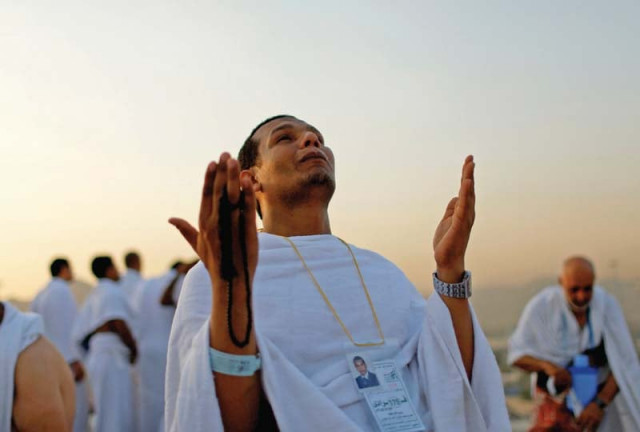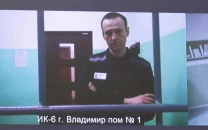Terrorism can’t be linked to any religion: Imam-e-Kaaba
Abdul Rahman al Sudais urges Islamic scholars to work for promotion of inter-faith harmony

A pilgrim prays on Mount Arafat outside Makkah during Hajj. PHOTO: REUTERS
The pilgrims gathered from sunrise at Mount Arafat to spend the most important day of the Hajj in prayer and reading from the Holy Quran.
For the first time in years, Saudi Grand Mufti Abdul Aziz al Sheikh did not give his traditional Arafat sermon. Okaz newspaper cited health reasons but Mufti Aziz still attended the sermon given in his place by al Sudais.
Imam-e-Kaaba urges unity among Muslims
In his wide-ranging sermon, the Imam-e-Kaaba said terrorism cannot be linked with a particular religion or nation, Islam is a religion of peace and has nothing to do with terrorism. “Muslim rulers will have to address the collective problems realising their responsibilities. Terrorism is the biggest problem and Islam has no link with it. Terrorists have no religion,” he said.

He urged unity among Muslims and warned about deviant ideologies reminding parents, teachers and scholars the responsibilities they have in nurturing the young away from deceptive messages.
“Muslims are passing through a difficult time but can overcome these difficulties only through unity,” al Sudais said while delivering the sermon from Masjid Nimra. “Hajj gathering is also a message of unity and the pilgrims should maintain this spirit in their home towns.”
Makkah Governor Prince Khalid al Faisal sat with the pilgrims as he listened to the sermon in which al Sudais thanked the Custodian of the Two Holy Mosques King Salman and the organisers of the Hajj for their efforts in making the pilgrimage easy for pilgrims.
Arafat is the site where the Prophet Muhammad (pbuh) gave his last sermon about 14 centuries ago after leading his followers on the pilgrimage.
Iranians are 'not Muslims', says top Saudi cleric
“Islam ensures the right of every human and every human has equal right. Teachings of Islam are based on justice and equality,” al Sudais said. “Prophet Muhammad (pbuh) issued the basic manifesto of Islam and human rights in his last sermon and said there is no difference between any Arabs and non-Arabs, black and white, rich and poor.”
Al Sudais said Muslims should act according to the manifesto given by the Holy Prophet (pbuh) and should ensure the safety, life and honour of all people. “Islam demands establishment of a government based on peace and stability in the world and for this purpose all Muslims should leave personal interests to ensure peace and inter-harmony among the people.”
The Imam-e-Kaaba said scholars were the inheritors of the prophets and that they should speak with truth and be a good example to the people. He urged Islamic scholars to work together for promotion of inter-harmony and avoid any act which causes scatter of Ummah.
Al Sudais asked the pilgrims to avoid politics during the Hajj. At the same time, he asked those in the media to show responsible reporting by avoiding ‘sensationalism and rumours’ and using their efforts to aid unity.
At midday prayer hundreds of thousands prostrated themselves, men and women side-by-side, in wide alleys that run between prefabricated pilgrim lodgings. Under multicoloured parasols to protect against the burning sun, the mass of people moved through broad streets which are closed to traffic around Mount Arafat. Throughout the day the faithful chant a traditional Hajj incantation, "God, here I am."
From a distance, the hill appeared a snowy white from the seamless two-piece white garment, ihram, worn by male pilgrims. They come from every corner of the globe, but Indonesia -- the most populous Muslim nation -- has the largest contingent.
“I have the impression of standing exactly in front of God,” said Khadem Ndyaye, 47, of Senegal. “Muslims came here from everywhere and we are all the same. If all the world was like that, there wouldn't be any war. Here, we feel that Islam is a religion of peace."
Islam does not allow extremism or terrorism: Imam-e-Kaaba
Indian pilgrim Muhammad Arafan, 40, said he feels ‘chosen by God’ for being able to perform the Hajj. "It's beautiful to see the Muslims of the world pray together here.”
In stifling heat, trucks loaded with bottled water were stationed throughout, and pilgrims doused themselves. Empty bottles and leftover meals littered the ground as ambulances patrolled.
After sunset they moved to Muzdalifah, halfway between Arafat and Mina, to gather 49 pebbles for a symbolic stoning of the devil, the last major rite of Hajj which begins today.

During that ritual in Mina last year a stampede killed roughly 2,300 people who were on their way to throw their stones at the Jamarat Bridge. Saudi Arabia issued a death toll of 769 but figures compiled from foreign officials in more than 30 countries gave a tally almost three times higher.
Authorities announced an investigation into the tragedy but no results have ever been released, although a number of safety measures have been taken. Among these is the distribution of a bracelet which stores pilgrims' personal data. Roads have also been widened in the Jamarat area, newspapers reported. Pilgrims told AFP they feel safe and noticed organisational improvements. AGENCIES
Published in The Express Tribune, September 12th, 2016.



















COMMENTS
Comments are moderated and generally will be posted if they are on-topic and not abusive.
For more information, please see our Comments FAQ